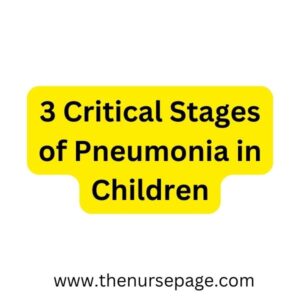Pneumonia is a common respiratory infection in children that can lead to severe illness if not recognized and treated early. It is critical for parents and carers to understand the phases of pneumonia in children so that they can recognize symptoms and get medical help when necessary.

Table of Contents
Stage 1: Onset of symptoms
The first appearance of symptoms is the Onset phase of pneumonia in children. Cough, fever, fast breathing, and chest pain or discomfort are all possible symptoms. Children may also feel tired, irritable, and lose their appetite. Symptoms usually appear suddenly and can follow a cold or other respiratory infection.
Stage 2: Consolidation
Consolidation is the second stage of pneumonia in children, which happens when the infection travels to the lungs and causes inflammation and fluid collection. During this stage, children’s symptoms may intensify, including a cough with yellow or green sputum, a high fever, and rapid breathing. They may also have chest pain or discomfort, and they may seem pale or blue due to low oxygen levels.
Stage 3: Resolution
The final stage of pneumonia in children is resolution, which occurs when the infection is successfully treated and the lungs begin to heal. Children may still have some symptoms at this stage, such as a persistent cough or exhaustion. However, the temperature usually goes away and the breathing eventually returns to normal.
It is crucial to note that the phases of pneumonia in children might differ depending on the severity of the illness as well as any underlying health issues. Some children may move through the stages more quickly than others, and others may encounter difficulties or require hospitalization.
Parents and carers should keep an eye out for any signs of pneumonia in their children and seek medical assistance if symptoms develop or do not improve within a few days. Antibiotics, relaxation, and plenty of fluids may be prescribed as treatment. Hospitalization may be required in rare circumstances to give oxygen therapy or other supportive care.
Finally, recognizing the stages of pneumonia in children is critical for early detection and treatment. Parents and carers can help ensure a rapid recovery and avoid potentially dangerous complications by recognizing the signs and obtaining medical attention when necessary.
FAQs on Stages of Pneumonia in Children
Q: What are the symptoms of pneumonia in children?
A: Symptoms of pneumonia in children include cough, fever, rapid breathing, chest pain or discomfort, fatigue, loss of appetite, and irritability.
Q: How does pneumonia progress in children?
A: Pneumonia in children typically progresses through three stages: onset of symptoms, consolidation, and resolution.
Q: What is consolidation in pneumonia?
A: Consolidation is the stage of pneumonia where the infection spreads to the lungs and causes inflammation and fluid accumulation. Children may experience worsening symptoms, including cough with yellow or green phlegm, high fever, and rapid breathing.
Q: What is the resolution of pneumonia?
A: Resolution is the stage of pneumonia where the infection is successfully treated, and the lungs begin to heal. During this stage, children may still experience some symptoms, such as a lingering cough or fatigue, but the fever will typically subside, and breathing will gradually return to normal.
Q: How can parents and caregivers monitor children for pneumonia symptoms?
A: Parents and caregivers can monitor children for pneumonia symptoms by watching for signs of cough, fever, rapid breathing, chest pain or discomfort, fatigue, loss of appetite, and irritability. They should seek medical attention if symptoms worsen or do not improve within a few days.
Q: What is the treatment for pneumonia in children?
A: Treatment for pneumonia in children may include antibiotics, rest, and plenty of fluids. In some cases, hospitalization may be necessary to provide oxygen therapy or other supportive care.
Q: Can pneumonia in children be prevented?
A: Pneumonia in children can be prevented by ensuring they receive recommended vaccinations, practicing good hand hygiene, avoiding exposure to smoke or pollution, and seeking prompt treatment for any respiratory infections.